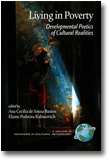
Living in Poverty
Developmental Poetics of Cultural Realities
Edited by:
Ana Clara S. Bastos
Elaine P. Rabinovich
A volume in the series: Advances in Cultural Psychology: Constructing Human Development. Editor(s): Jaan Valsiner, Niels Bohr Professor of Cultural Psychology, Aalborg University.
Published 2010
This book covers the results of investigation of social realities and their public representation in Brazilian poor communities, with a particular emphasis on the use of cultural tools to survive and create psychological and social novelty under conditions of severe poverty. A relevant part of it brings together the multi-faceted evidence of a decade of research concentrated in two particular low-income areas in the city of Salvador da Bahia, Brazil. Other studies conducted in other Brazilian areas and in Cali, Colombia are included.
In contrast to most representations of poverty in the social sciences which create a “calamity story” of the lives of poor people, the coverage in this book is meant to balance the focus on harsh realities with the cultural-psychological resiliency of individuals and families under poverty.
CONTENTS
Series Editor’s Preface. The Importance of Being In-Between, Jaan Valsiner. Editors’ Introduction. Realities of Living: From Poverty to Poetry, and Beyond, Ana Cecília de Sousa Bastos and Elaine Pedreira Rabinovich. Part I: New Ways of Looking: Poverty as Social Reality and Personal Survival Context. The Amulet House: Brazility As an Empty Mirror, Elaine Pedreira Rabinovich. Coloniality, Urbanization, and Poverty: Heuristics Constructions Based on the City of São Paulo, Brazil, Eda Terezinha de Oliveira Tassara and Marcello Giovanni Tassara. Cultural Dynamics in a Brazilian Community: Representation and Re-elaboration of Meaning in Morro Vermelho, Miguel Mahfoud and Marina Massimi. Studying Poor Families in Salvador, Brazil: Reflections After Two Decades, Ana Cecília de Sousa Bastos. Commentary on Part I. The Wealth of Poverty and the Poverty of Wealth: An Invitation for an Encounter, José Crisóstomo de Souza. Part II: Developmental Contexts and Trajectories: The Reality of Living in Everyday Contexts. Between Tides and Swamps: Developmental Contexts of Brazilian Children, Elaine Pedreira Rabinovich, Lia Lordelo, and Ana Cecília de Sousa Bastos. Semiotic Approach on Developmental Trajectories of Families Living in Poverty, Milton Barbosa de Almeida Filho and Ana Cecília de Sousa Bastos. Transitions Through Adolescence in Novos Alagados: Reflections on an Experience Report (1995–2006), José Eduardo Ferreira-Santos. Adolescents in Brazil: Developmental Possibilities between Risk and Protection, Mirela Figueiredo Iriart and Feizi Milani. Commentary on Part II-A. Families and Children in Poverty: Objective Definitions, Subjective Lives, Nandita Chaudhary. Commentary on Part II-B. Adolescents and Families: Convergences, Peculiarities and Contrasts in Poverty and Other Life Conditions, Ana Maria Almeida Carvalho. Part III: Poverty, Development and Children’s Rights. The Face of Law in Everyday Life: A Case Study in Novos Alagados, Salvador, Bahia, Isabel Maria Sampaio Oliveira Lima. Protection Offered to Poor Children by The Holy House of Mercy in Bahia During the 19th Century, Antonio Marcos Chaves, Roberta Tavares de Melo Borrione, and Giovana Reis Mesquita. The Attention to Children in a Poor Brazilian Neighborhood: Possibilities and Limitations of Daycare, Eulina da Rocha Lordelo and Lúcia Vaz de Campos Moreira. Socioeconomic Status, Quality of Domestic Environment, and Cognition in Early Childhood: An Epidemiological Study of Brazilian Children, Letícia Marques dos Santos, Darci Neves dos Santos, and Maurício Lima Barreto. Cognitive Development and Interaction Contexts, Mariela Orozco Hormaza, Adolfo Perinat Maceres, and Hernán Sánchez Ríos. Commentary on Part III-A. Children’s Development Under Conditions of Poverty: A Cultural–Ecological Analysis, Jonathan Tudge. Commentary on Part III-B. The Illusion of Child Protection in Brazilian Reality: Challenges for Psychology, Raquel S. L. Guzzo. Part IV: Qualitative App roaches and the Realities of Lives Un der Poverty: Relational Dynamics in Context. Belongingness: Family and Community Life in Carmo, Elaine Pedreira Rabinovich. Relational Systems Under Poverty: Contextual Changes, Urban Violence and its Impacts on Everyday Life, Miriã Alves Ramos de Alcântara and José Eduardo Ferreira Santos. Interventions in Family and Health: Lessons From the Family Health Program in Brazil, Leny A. Bomfim Trad. Perception of and Reaction to Social Inequalities in Two Brazilian Black Communities, Mônica Nunes and Maurice de Torrenté. Commentary on Part IV-A. Inequality, Family, Poverty, and Governmental Practices: A Look from Antrhopology, Jocélio Teles dos Santos. Commentary on Part IV-B. Family and Poverty: The Inclusion Routes, Giancarlo Petrini. About the Contributors.
-
Paperback978-1-60752-317-8
Web price: $62.04 (Reg. 72.99)
-
Hardcover978-1-60752-318-5
Web price: $89.24 (Reg. 104.99)
- eBook9781607523192

- EDU015000 - EDUCATION: Higher
- EDU037000 - EDUCATION: Research
- SOC045000 - SOCIAL SCIENCE: Poverty & Homelessness
-
 Culture, Work and Psychology
Invitations to Dialogue
Culture, Work and Psychology
Invitations to Dialogue
-
 Deep Loyalties
Values in Military Lives
Deep Loyalties
Values in Military Lives
-
 Drama of Multilingualism
Literature Review and Liberation
Drama of Multilingualism
Literature Review and Liberation
-
 From Dream to Action
Imagination and (Im)Possible Futures
From Dream to Action
Imagination and (Im)Possible Futures
-
 Home in Transition
The Cultural Construction of Heimat
Home in Transition
The Cultural Construction of Heimat
-
 Making of Distinctions
Towards a Social Science of Inclusive Oppositions
Making of Distinctions
Towards a Social Science of Inclusive Oppositions
-
 Ornamented Lives
Ornamented Lives

